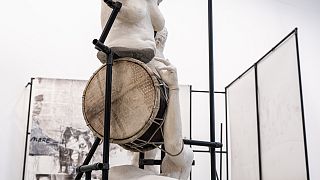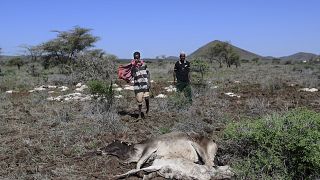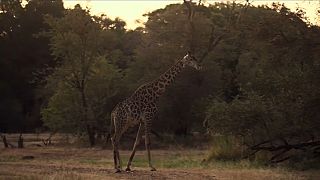South Africa
Africa's fauna is at the heart of Roger Ballen's latest exhibition. The artist explores through installations and multimedia works the troubled relationship between humans and nature.
The exhibition titled End of The Game has drawn crowds to Johannesburg's Inside Out Centre for the Arts since March 28.
"There are a lot of people who grew up in the cities in Africa and other places in the world who have no relationship to nature. They spend their lives in a city. They don't hardly know what a tree looks like anymore. Their whole life is virtual," the artist argues.
"...they have no relationship to nature itself. This exhibition also wanted to also make people familiar that there is a natural world out there and there is a crisis going on."
From the killing of elephants in the 18th century that began the ivory trade to the decimation of the rhino population from animal hunting, Ballen argues through his provocative art installations and multimedia artworks that humans remain at the forefront of the destruction of African wildlife.
The 73-year-old American-born photographer used artefacts collected from metal scrap yards, hunting farms, pawn shops and roadsides during his local and international travels over a career of more than 40 years.
"What you find here are artistic installations, and artistic installations are, in a way, putting things together in such a way that they were never seen that way before."
"So, you create a greater impact because it's not just putting things together in a way that everybody knows they should go together. It's putting things together in an imaginative, creative way that still has an impact and challenges the viewer in all sorts of ways..."
One of the centerpieces of the exhibition is the documentary section, which includes objects, texts, photographs and books documenting early years of hunting expeditions in Africa.
The section deals with the initial destruction of African wildlife around 1890, 1900 and 1910, says Ballen.
A curated display with early versions of weapons and ammunition used to kill bigger animals leads into the "Hunter’s Room" a staged installation depicting archival photographs and items in a staged safari setting.
A hunter figure made from wax is the main character in the room, surrounded by his hunting memorabilia and collectibles.
Publicized hunting expeditions
Some of the photographs include archive pictures of former U.S. president Theodore Roosevelt’s much publicized hunting expeditions in Kenya and Winston Churchill’s east African safari, both in the early 1900s.
Hunters can be seen on films towering victoriously over their trophies, mostly dead giraffes, elephants and rhino.
Others depict Africans having conquered elephants, lions and leopards.
Items on display include animal skins, rusted metal and steel beds, thick halyards and dilapidated wooden furniture.
The exhibit will remain on display indefinitely.
A typical Saturday morning at the gallery is a hive of activity as visitors come in to see what some have described as a "thought-provoking" body of work.
"I think people will walk away from here thinking about their relationship with animals and how they feel about conservation and hunting and things like that," says Shelley Drynan, a visitor to the gallery.
Sarah Wilding, another visitor who says she was familiar with Ballen's earlier works, says she is stirred by the exhibition's varied depiction of African wildlife and its destruction over many years.
"To just be here and feel the melancholy and the mystery, there are just so many emotions swelling, it is truly a fantastic experience to be here," she says.












Go to video
African gut study reveals urbanization threatens microbial diversity
01:54
South Africa's independent mechanics join forces to compete with big companies
02:14
Scientists find way to identify elephant ivory disguised as legal mammoth ivory
01:48
South Africa launches vaccination drive to combat foot-and-mouth disease outbreak
Go to video
Women redefine Gnaoua at Essaouira Festival